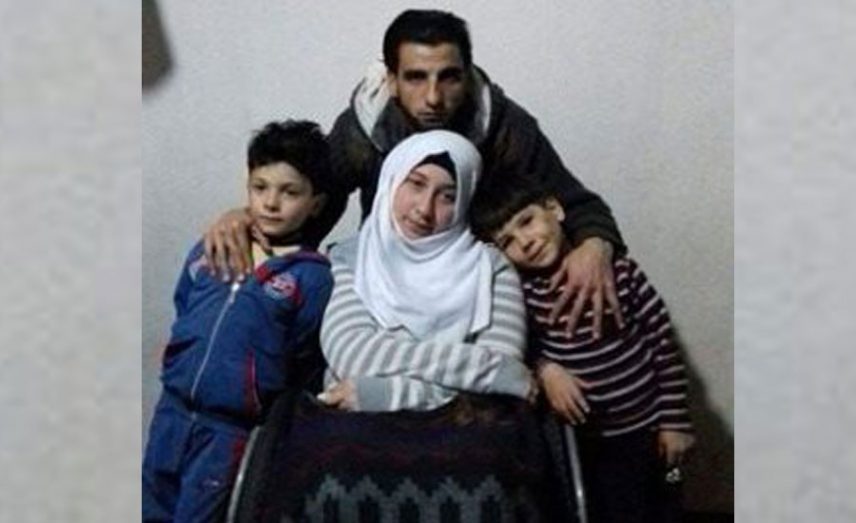Khadijah Mustafa al-Saloum, a 22-year-old woman born in the town of Murak and married in the city of Al-Lataminah, lived happily with her two children, until Aug. 20, 2012, when a shrapnel from a regime mortar bomb caused her to lose her ability to walk.
Khadijah was afflicted with partial paralysis as the shrapnel punctured her lungs, broke her sixth, seventh and eighth vertebrae, and destroyed her left kidney and spleen.
After being wounded, Khadijah was taken to the Kafr Zita hospital and received primary care. However, because of the gravity of her condition and the weak capacities of the hospital, she was transferred to the Syrian-Turkish border, and then brought into Turkish territory with her two children and her husband to receive appropriate treatment in a recovery center in the city of Reyhanli for five months.
After the improvement in her health, her residence in the recovery center was no longer necessary and she left, now a paraplegic, to begin her hardest battle.
Khadijah fought with all she had for the sake of her husband and her children. She suppressed her pain and stubbornly confronted her disability. Her husband was father, brother and friend, as Khadijah puts it, and so she decided not to surrender.
She joined the team of Life Makers with the Life Makers Educational Center for the Disabled, which was established by Syrian women. Along with them, Khadijah tried to plant hope and confidence in the hearts of those living in conditions like hers, visiting them, exchanging experiences she’d gained and discussing with them possible work opportunities. Khadijah’s difficult material circumstances and her physical conditions which requires her husband to stay with her have pushed her to find work that suits her. She found a purpose in learning computer and programming skills.
Fayiza al-Awad, director of the Life Makers Educational Center, spoke about Khadijah’s determination and her refusal to give in. She pointed to the hardship Khadijah faces in moving between her home and the center to help her beloved husband, “For that reason we are trying with some of the organizations to secure a car for transporting the disabled in hopes that we can obtain one to reduce the hardship of our children with special needs.”
Khadijah today learns programming skills in the Life Makers Center and teaches children with special needs the expertise she has learned in her house and in the center, in exchange for modest sums to sustain the family, which is still brought together by love.
Khadijah says: “It’s my life and I will not make it a commodity for others. I will plan for a better life and I will live as I want.”
This article was translated and edited by The Syrian Observer. Responsibility for the information and views set out in this article lies entirely with the author.


